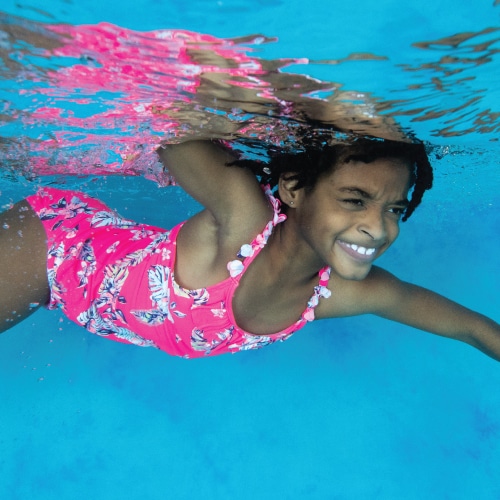 Children Learing To Swim
Children Learing To Swim
We often think of learning to swim as a one-time achievement: either you can swim, or you can’t. In truth, learning to swim is more of a journey. Different skills are appropriate to different age groups. While many parents think that children can learn to swim in just a few lessons, becoming a life long swimmer takes time.
Swimming Is An Important Skill
According to the CDC, drowning is second only to congenital anomalies as the cause of death in children ages 1-4. Among all children 1-14, it remains the second most frequent cause of death, behind motor vehicle accidents.
Ensuring your children know how to swim and how to survive in the water helps keep them safe. We start lessons as young as six months and offer eight levels of lessons. Your children learn skills appropriate to their age and knowledge and then progress to the next level when they are ready.
The Smallest Swimmers
Studies suggest that teaching children under four how to swim and survive in the water will lower their risk of drowning. At Bear Paddle, we include parent participation in our Teddy Classes for children under the age of three. Children first learn basic skills like floating, paddling, and pulling themselves out of the pool. Later, they’ll learn simple strokes and how to swim to the wall and pull themselves up to perform a Tummy Pool Exit.
Older Children Still Need Lessons
Harvard Medical School says that on average, children need to be four years old before they can properly learn to swim. That’s because their cognitive skills haven’t developed enough to retain the knowledge and follow directions before then.
However, that does not mean you shouldn’t start your children’s lessons sooner. As Harvard notes, important skills are taught in those early lessons that may save your child if he or she falls in the water. Additionally, since some children develop earlier than others, your child may be ready to progress to more advanced skills at a younger age.
Starting your children’s lessons at a young age will help them become comfortable in the water and teach them swimming survival skills but since they need to be a little older to learn more advanced skills, it’s important to keep taking lessons. Harvard also recommends that you choose a school like Bear Paddle, that has a clear curriculum and path for progression.
It Pays To Go Beyond The Basics
Even if you think you’re child swims like a fish and is perfectly confident in the water, it still makes sense to continue swimming lessons.
As your children continue to grow and learn, they are able to master more skills. Advanced skills could be important if your children are ever in danger. Even the strongest swimmers can find themselves in trouble if they end up in strong currents or pulled far from the shore.
Knowing many techniques can save your child in such a situation. Being able to switch between swimming techniques allows your child to rest muscles and stay afloat.
Fun and Health
We believe that learning to swim is an important life skill to keep your child safe, but swimming is also fun and a good way to stay healthy. Continuing swimming lessons for children keeps their muscles in shape, improves circulation, and helps their balance too.
At Bear Paddle Swim School, we believe children should stay enrolled as long as possible. Swimming is good exercise, and advanced skills could potentially save your child’s life in the future.
As children master additional skills, they can participate in competitive swimming. Competitive swim teams provide an opportunity to master teamwork and perseverance in addition to their swim skills.
Fall registration is now open! Lessons start Tuesday, September 3. View our Fall Schedule and register for class today!
